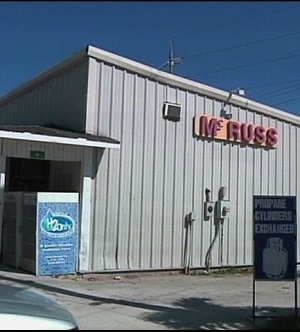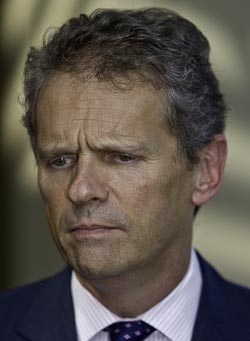Archive for September 25th, 2014

Jury finds drug mule guilty
(CNS): A 24-year-old woman from West Bay was found guilty Thursday of smuggling almost three kilos of cocaine (6.28lbs) into Cayman from Colombia hidden inside the wooden slats of three hammocks. It took a jury of five women and two men just over an hour to convict Kenecia Melissa Millwood, who denied knowing anything about the drugs, which were concealed in the hammocks and picked up by customs officers at the airport earlier this year. Millwood claimed she had travelled to Colombia for a short vacation to meet distant relatives she had found on Facebook and while there she had, at the suggestion of a friend named ‘Beanie’ back in Cayman, purchased the hammocks as gifts.
Having taken the stand to give evidence on her own behalf, Millwood told the court that she had been taken to the store to buy hammocks for herself and two family members by her cousin in Colombia. She said she had bought three and then asked for the wooden frames to be varnished.
The defendant had told the court that she did not go to collect the hammocks herself before she left but they were picked up by her cousin and she did not see them until she arrived at the airport in San Andres to return to Cayman. The hammocks were checked with her luggage, Millwood told the court, but when she arrived at Owen Roberts Airport, the customs officers x-rayed the hammocks several times and the drugs were uncovered.
She said she knew nothing at all about the cocaine and she was hysterical and confused when the drugs were found at the airport.
Millwood told the court that she did not believe her cousin knew her friend 'Beanie', who was also known as Wayne, but she was aware that they had spoken with each other several times on the phone while she was there as she had used her cousin’s handset.
The court heard that Millwood had known ‘Beanie’, or Wayne, for nine years and they were close friends who had been in a relationship in the past but she did not know his second name. She also revealed that although 'Beanie’ was no longer her boyfriend, they still sometimes had sex together and he would also find other men to have sex with her for money.
Millwood revealed to the court that she had worked at K-Tone and Karma restaurant part-time but had supplemented that income with the money she earned in prostitution. She told the court it had taken her several weeks to save the money to take the vacation to Colombia and when she was there she bought several things for herself and ‘Beanie’, who had sent her money for the things he wanted.
Although the court heard that the couple had exchanged several ‘WhatsApp’ messages about the hammocks on her last day in Colombia, she denied being a drug mule who was bringing the drugs for her friend ‘Beanie’.
However, the jury were not convinced and returned a guilty verdict Thursday afternoon. Millwood sat quietly in the dock as the verdict was read out and was remanded in custody until her sentencing hearing scheduled for 10 October.

Iguana causes outage for CUC’s West Bay customers
 (CNS): A large iguana coming into contact with the lines near the Hydesville Substation in West Bay Thursday morning cut power to CUC customers in the district and along the West Bay Road. Meanwhile, in Savannah and in Prospect pockets of customers experienced outages because of lightning blowing fuses. The iguana caused an interruption to service from 9:09am for around an hour with power being restored by 10:00am, a CUC spokesperson said. Customers in the Savannah and Prospect areas lost power at around 9:15am. The Savannah area was restored by 10:55 but crews were unable to restore power in Prospect until around 11:30am.
(CNS): A large iguana coming into contact with the lines near the Hydesville Substation in West Bay Thursday morning cut power to CUC customers in the district and along the West Bay Road. Meanwhile, in Savannah and in Prospect pockets of customers experienced outages because of lightning blowing fuses. The iguana caused an interruption to service from 9:09am for around an hour with power being restored by 10:00am, a CUC spokesperson said. Customers in the Savannah and Prospect areas lost power at around 9:15am. The Savannah area was restored by 10:55 but crews were unable to restore power in Prospect until around 11:30am.
He explained that the bad weather also hindered crews trying to repair lines as the persistent lightning and heavy rains around the Island preventing them from working on the lines.

Armed men rob grocery store
 (CNS): Shots were fired by armed robbers on Wednesday night when they held up a grocery store in Prospect and stole over $1200. At about 8:18 pm last night (24 Septemebr) two masked men each armed with silver handguns entered the McRuss Grocery store at the intersection of Shamrock Road and Marina Drive. The robbers approached the 36 year old female cashier working in the store and demanded the cash from the till. One of the robbers had a black rucksack which they used to fill with cash. Two shots were then fired before the robbers made their escape towards the store’s car park and disappeared. (Photo courtesy of Cayman27)
(CNS): Shots were fired by armed robbers on Wednesday night when they held up a grocery store in Prospect and stole over $1200. At about 8:18 pm last night (24 Septemebr) two masked men each armed with silver handguns entered the McRuss Grocery store at the intersection of Shamrock Road and Marina Drive. The robbers approached the 36 year old female cashier working in the store and demanded the cash from the till. One of the robbers had a black rucksack which they used to fill with cash. Two shots were then fired before the robbers made their escape towards the store’s car park and disappeared. (Photo courtesy of Cayman27)
Alongside the cashier a 42-year-old male customer was also in the store but despite the discharge of the firearm no one was physically hurt in the stick -up. The men stole a total of CI$1,202.77 from the store that has been the victim of several robberies over the last few years.
They armed robbers were described as tall and slim build, dressed in all black clothing. They wore dark gloves, baseball hats, and they had dark T-shirt type masking around their faces. They both spoke with a Caymanian accent.
Anyone who may have witnessed the incident or who may have information that could assist police investigation is asked to contact DC Dyer or Sergeant Lloyd Hickey at 949-7710 or the RCIPS tip-line 949-7777, or Crime Stoppers on 800-8477 (TIPS).

Book worms reap rewards from reading contest
 (CNS): Ten -year-old Thomas Sevick, a student from Cayman Brac read for almost 5500 minutes this summer in the library service’s Summer Reading Challenge. Thomas took the top prize in the contest way ahead of his next rival, nine-year-old Sahara O’Connor, from Grand Cayman who came second with a total of 3,761 minutes. Both kids won bicycles and helmets courtesy of sponsors Cox Lumber and the Library Service but dozens of other youngsters who took part also won prize for participation, including iPads, iPods, games, toys, activity packets and more. Overall 74 students took part in the literacy initiative during the school break.
(CNS): Ten -year-old Thomas Sevick, a student from Cayman Brac read for almost 5500 minutes this summer in the library service’s Summer Reading Challenge. Thomas took the top prize in the contest way ahead of his next rival, nine-year-old Sahara O’Connor, from Grand Cayman who came second with a total of 3,761 minutes. Both kids won bicycles and helmets courtesy of sponsors Cox Lumber and the Library Service but dozens of other youngsters who took part also won prize for participation, including iPads, iPods, games, toys, activity packets and more. Overall 74 students took part in the literacy initiative during the school break.
The annual summer challenge is designed to encourage children between the ages of six and 17 to read age-appropriate books, for a minimum number of days and minutes during the summer. It aims to combat any regression in young people’s abilities during the long summer break,
Director of the Public Library Service Ramona Melody said she was delighted with the success of this year’s challenge which was supported by parents, friends and organizations. “I am confident that the programme will continue to grow, and to help our children become strong readers,” she said. “Reading skills are important to success in school and work. Furthermore the results of the Summer Reading Challenge confirm that reading can be a fun and imaginative activity for children, which opens doors to all kinds of new worlds for them.”
At the end of the summer, the Library sends a letter to school principals advising them of students who completed the challenge.

Vegas witness reveals Mac’s c/c PIN was working
 (CNS): An employee of Global Cash Access Incorporated, a company offering cash services at casinos throughout the United States, explained Wednesday how McKeeva Bush had taken advances on his CIG credit card using both their ATMs and cashier services. Testifying via video link from Las Vegas, Jonathan Marquez confirmed the use of the former premier’s card on several occasions from the crown’s documented list of transactions at the firm’s ATMs, where he had used a PIN to access money, despite telling his government colleagues that the PIN for the CIG card did not work. Bush had said this was why he had used casino cashier services to get money he needed for medicines and security staff when travelling.
(CNS): An employee of Global Cash Access Incorporated, a company offering cash services at casinos throughout the United States, explained Wednesday how McKeeva Bush had taken advances on his CIG credit card using both their ATMs and cashier services. Testifying via video link from Las Vegas, Jonathan Marquez confirmed the use of the former premier’s card on several occasions from the crown’s documented list of transactions at the firm’s ATMs, where he had used a PIN to access money, despite telling his government colleagues that the PIN for the CIG card did not work. Bush had said this was why he had used casino cashier services to get money he needed for medicines and security staff when travelling.
The fraud expert from the company, who supplied the crown with the documents supporting Bush’s use of his own credit cards as well the government card, went through various transactions the former premier made in casinos. Appearing mid-way through the deputy governor’s evidence on Wednesday, the court interposed the evidence as it was delivered on a live video connection.
Marquez explained that Global Cash Access offered people access to money via ATMs in the casinos on their debit or credit cards and that they also allowed people to make a cash advance with a teller, which was a way of circumventing the daily limits placed by banks and credit card companies on cash withdrawals on most cards. He confirmed that Bush had taken cash from cashiers and ATMs in several different casinos, including the Venetian, which was described as a major casino on the strip.
The witness indicated several late night and early morning cash advances that Bush had made on his cards in casinos in Las Vegas and Florida on his government card, as well as his own in the ATMs using a PIN to get cash. Then, in some examples on the same night Bush would use the cashier services, where he would sign on a transaction for a cash advance, which would give him access to much larger amounts and get round the cash limit for any twenty-four hour period. The witness confirmed Bush’s largest single cash advance transaction on the corporate card was $4,000.
He also confirmed that the crown’s documents demonstrated that Bush would sometimes use the ATM service with a PIN number until he exceeded his daily limit, and then after failed attempts move on to the cashier and direct advances.
Following his arrest regarding the cash withdrawals, according to their evidence, Bush had told several senior civil servants, including Kenneth Jefferson, Sonia McLaughlin and Franz Manderson, that because his PIN did not work and he had difficult using the card in ATMs, he had used cash advance services in casinos to get the money he needed to buy medicines and armed security when travelling overseas.

Latest traffic clamp down nets rogue drivers
 (CNS): The RCIPS doled out tickets to a dozen drivers on Wednesday during the latest traffic clamp down. Although the cops are focusing on unsafe loads after issuing warnings last week about the dangers associated with overloaded or badly loaded trucks, they were also on the look-out for other offences. Uniform officers from the George Town Police Station carried out the traffic checks along Huldah Avenue at the junction of the Smith Road Oval on 24 September. An RCIPS spokesperson said that more than 12 people were prosecuted for traffic offences ranging from unlicensed vehicles, driving without insurance and failing to wear seatbelt.
(CNS): The RCIPS doled out tickets to a dozen drivers on Wednesday during the latest traffic clamp down. Although the cops are focusing on unsafe loads after issuing warnings last week about the dangers associated with overloaded or badly loaded trucks, they were also on the look-out for other offences. Uniform officers from the George Town Police Station carried out the traffic checks along Huldah Avenue at the junction of the Smith Road Oval on 24 September. An RCIPS spokesperson said that more than 12 people were prosecuted for traffic offences ranging from unlicensed vehicles, driving without insurance and failing to wear seatbelt.
The offence of unsafe load is one of the key offences being targeted as well and the operations will continue the police stated. The Department of Vehicle Licensing are also partnering with the RCIPS on these traffic operations.

Sea level rises not yet detected in Cayman
 (CNS): The lands and survey department says there has been no significant movement of the sea level on either Grand Cayman or the Sister Islands. Despite two recent earthquakes and the very high tides experienced in the last few weeks, the local experts claim that no major geographical changes have taken place. With all low-lying islands like the Cayman Islands and coastal nations keeping an eye on ocean rises, officials from L&S said they were continuing to reassess mean sea level data as a priority and several tide gauges have beeninstalled throughout the Islands. “This is a high-priority, long-term project,” added Rupert Vasquez, the L&S director.
(CNS): The lands and survey department says there has been no significant movement of the sea level on either Grand Cayman or the Sister Islands. Despite two recent earthquakes and the very high tides experienced in the last few weeks, the local experts claim that no major geographical changes have taken place. With all low-lying islands like the Cayman Islands and coastal nations keeping an eye on ocean rises, officials from L&S said they were continuing to reassess mean sea level data as a priority and several tide gauges have beeninstalled throughout the Islands. “This is a high-priority, long-term project,” added Rupert Vasquez, the L&S director.
The tide gauges measure the extent of the recent high tides and compare them to data from previous years. Data collected recently indicates that, whilst sea levels at high tide have been higher this month, there has been no discernible long-term upward or downward movement of the sea level of Grand Cayman or the Sister Islands.
The combination of high tides and two short earthquakes measuring over 5 on the Richter scale this month, focused attention on the issue of sea levels as well as landmass elevation and the possible connections between the two.
Both quakes were detected south of Grand Cayman on Wednesday, 3 September registering 5.1 and 5.2 on the earthquake measure Richter scale. L&S said there were no horizontal or vertical changes in position recorded for these Islands after the two events.
While Hazard Management Cayman Islands (HMCI) monitors quakes and other potential disaster it partners with L&S and other agencies regarding the science and geological impact.
Vasquez explained his department is responsible for the, “accurate and efficient land surveying in the Cayman Islands,” and the National Control Network forms the critical component of local infrastructure services. Data from the Cayman Islands’ Continuously Operating Reference Stations, the specialist tools used to measure geological shifts from the recent quakes was compared with data from Florida, Mexico and Jamaica. The results showed show no notable local differences detected before or after the earthquakes. In both cases, the differences measured in our geographic position varied by only a few inches and considered “normal”.
Vasquez said L&S staff members continue to conduct detailed investigations and intensive monitoring, following these occurrences.
The monitoring is largely out of public view as the experts use hundreds of ground-based monuments and four continuously-operating GPS /GNSS base stations all part of a wider Caribbean network. The data is collected in real-time, monitored and stored locally, then shared online with the international community through the United States National Geodetic Survey (NGS).
Tectonic movement is a natural phenomenon, and the technology used by L&S is showing interesting movements. The monitor positioned on the roof of the new Government Administration Building in George Town indicates that the Cayman Islands is moving steadily but slightly towards the west, at less than half of an inch annually.
However, if sudden and unexpected tectonic plate movements occur they are detected by the monitors and shared with the American National Geodetic Survey, which compares the data across the western hemisphere.
For details on local earthquake monitoring, and to see the live graphs, charts and maps, visit: http://earthquaketrack.com/r/cayman-islands/recent

FOI reveals lost document
(CNS): The Education Ministry appears to have lost a 2011 report requested under the freedom of information law but has refused to make public an updated 2014 document, despite the fact that at least some of the information is now in the public domain anyway. The Information Commissioner’s Office (ICO) is also of the opinion that the applicant, which is CNS, has grounds to appeal the refusal. The information requested pertains to the amalgamation of the primary schools on Cayman Brac – which has since been revealed as one of the proposals made in the Ernst & Young report on the rationalization of government. Unlike the information requested, this was released into the public domain on 9 September in the spirit of openness and transparency.
On 18 February this year CNS requested a 2011 document regarding proposals for cost savings for the provision of education on Cayman Brac; the PowerPoint presentation regarding this proposal produced in 2011; any updated report on the same subject (proposals for cost savings for the provision of education on Cayman Brac) that has been produced since 2011; and the current enrollment figures and teacher/student ratios of all government primary schools and the Lighthouse School.
The ministry released the teacher/student ratios requested but refused the other documents regarding the potential cost savings of amalgamating the Brac primary schools.
The savings of this proposal is now known to be estimated at $600,000 per year. The E&Y report (see below, page 76) also lists the potential educational benefits of the amalgamation, which includes more time per student for PE, music and art, more scope for ensemble music and team sports, and more classes of optimum size (15-25 students).
Furthermore, the reports says, although five teachers’ and one principal’s posts would be lost, the headcount savings could be put towards a speech and language therapist based on Cayman Brac.
Also noted was the potential to use the existing Spot Bay campus for the relocation of the UCCI Brac campus, thus saving rent for the local university.
Potential risks and issues listed by E&Y focused on public perception by Brac residents. The loss of professional jobs on the island “may meet with resistance”, the consultants noted. They also pointed to additional transportation time for some parents, but noted that existing school transportation services could be extended to those affected.
“The loss of certain teachers who are highly regarded by the community may be controversial,” the report said, but outlined how this too could be mitigatedby offering support and career development for younger Caymanian teachers to transfer to Grand Cayman to develop skills and experience.
Nevertheless, while the public now has what information is in the E&Y report, the ministry continues to withhold their recent report on the subject, which might offer the public a better understanding of the proposal, on the grounds that it was prepared for Cabinet. It has also, apparently, lost the original document about this proposal prepared three years ago and, in the FOI response, completely ignored its one-time existence.
The ICO said in its response to the appeal by CNS: “In regards to record keeping, the ICO notes that each Public Authority has an obligation to keep accurate records under the Public Record and Archives Law. In this case existing records appear to have been updated and no record of previous versions was kept. That is the Applicant requested 2011 documents, which appear to have existed at some point, but received records dated 2014.”
CNS appealed the refusal by the ministry on two counts and ICO Analyst Clara Smith in her report to asses the grounds for appeal said that while it was possible that the ministry had grounds for refusal, it had not supplied any documented evidence to support its claims.
Investigating whether the disputed records were, as the ministry maintained, opinions, advice or recommendations prepared for Cabinet, the analyst saidthat the records did not appear to indicate this, nor did the cabinet minutes provided by the ministry regarding this issue reference the relevant documents.
The ICO was provided with a Ministerial Affidavit, and said the minister “indicated that the responsive records were created for her view” (which the 2011 could not have been). However, the ICO noted that meetings of cabinet and subcommittees “were not discussed in the affidavit”.
The FOI watchdog analyst also looked at whether releasing the records would inhibit the free and frank exchange of views, as the ministry maintained.
in her response on behalf of the ministry, the chief officer at the time, Mary Rodrigues, had stated that “… civil servants must be able to share all possible options and provide advice and recommendations freely and frankly to be considered by senior management and by policy makers to ensure decision making processes are robust. Releasing records – particularly before a decision has been made on the proposals – would likely restrict the open dialogue that currently exists within the Ministry to share ideas and opinions which often include ‘thinking outside the box’.”
However, the ICO said that the records did not show the views of individual civil servants; that the names within the documents were those of senior ministerial officers; and that the recommendations were evidenced based practical measures.
The ministry had claimed: “It would not be in the public Interest for public servants to be restrained in the execution of their duties by the fear of the proposals they make – particularly if those proposals are not accepted by the government and contain recommendations that would be unpopular among general population – being made public under that FOI law.”
However, the ICO said that the arguments to support this argument “were not convincing given the specific circumstances of these records. In particular, that the recommendations were made by senior civil servants who should have an expectation of accountability should be addressed. Furthermore, the recommendations were not unusual given the circumstances. There was at least a possibility that the recommendations would have been well received. There is no evidence provided of the actual repercussions for these civil servants that would result in future inhibition.”
Following the ICO report, the ministry has now released the names of government officialsand Cabinet members present at a focus group meeting with parents (understood to be the presidents and vice-presidents of the Brac PTAs) and Education Council members, even though CNS had amended the original FOI request to exclude the names of civil servants involved.
Related articles on CNS:
CNS: The article has been amended. an earlier version indicated that the ICO had made a decision on the matter.

Taylor had champagne on ice
 (CNS): The former governor of the Cayman Islands had intended to enjoy a quiet “bottle of bubbly” once McKeeva Bush had been arrested, the court heard Wednesday as the former premier’s defence attorney read from a number of emails between Duncan Taylor and an FCO official named in the court as just "Tony". When Geoffrey Cox QC continued to probe Manderson about his involvement in an alleged conspiracy, he revealed more emails that demonstrated Taylor’s eagerness to see the premier arrested before the 2013 election on the current as well as other charges that were pending but never brought against Bush for more alleged abuse of his CIG credit card.
(CNS): The former governor of the Cayman Islands had intended to enjoy a quiet “bottle of bubbly” once McKeeva Bush had been arrested, the court heard Wednesday as the former premier’s defence attorney read from a number of emails between Duncan Taylor and an FCO official named in the court as just "Tony". When Geoffrey Cox QC continued to probe Manderson about his involvement in an alleged conspiracy, he revealed more emails that demonstrated Taylor’s eagerness to see the premier arrested before the 2013 election on the current as well as other charges that were pending but never brought against Bush for more alleged abuse of his CIG credit card.
Cox read from the correspondence sent to the FCO updating "Tony" on the ongoing investigations where Taylor spoke about breaking open the champagne once Bush was arrested and charged. He had written that he believed “there would be a huge sigh of relief across the Cayman Islands” when he was eventually charged, at least in the credit card case.
As Cox probed Manderson over his part in the alleged political conspiracy to oust Bush from office, he pressed him about a meeting with the governor and the UDP Cabinet after his client’s arrest. However, Manderson persistently denied being present at any meeting where the governor had tried to persuade Bush’s then Cabinet colleagues to vote against him ahead of the no confidence motion in the LA following the arrest and after Bush had refused to step aside.
In the wake of the subsequent charges against Bush in March 2013, further emails from Taylor to "Tony" spoke about the governor’s desire to ensure that other charges which were expected to be added to the indictment against Bush were exposed.
These related to more alleged personal use of the card in New Orleans. Taylor told his FCO colleague that he “had tipped off” a local journalist so they could check the court records and write a report about the growing case against Bush.
Cox probed Manderson about his knowledge of the damning correspondence but the deputy governor continued to state that he did not know about the emails or the position that the governor was taking. The attorney described the governor’s actions as deliberately trying to “maximize the harm” that the arrest and charges were causing the serving premier as he accused the UK’s representative of disgraceful behavior. He suggested Taylor had deliberately sought to make matters worse for Bush and ensure his downfall.
The attorney also questioned Manderson over comments that Taylor made about the director of public prosecutions when it turned out that no further charges were brought against Bush. In his correspondence with "Tony" the then governor had implied that her office could have made some kind of an agreement and even “colluded with Bush’s attorneys” to prevent the extra charges being laid.
Manderson said that any urgency surrounding the arrest and charges against Bush was because everyone wanted the matter brought to a swift conclusion and resolved. He said the case had gripped the Cayman Islands.
“It was a sad day in our history,” he said, adding that there was a concern that the issue was dealt with as quickly as possible.
Manderson disagreed with Cox's suggestion that Taylor’s interference and intentions were politically motivated. The deputy governor described discussing various hypothetical scenarios with the governor about the possibleoutcomes of the investigations against Bush and the need for them to prepare and manage any eventuality relating to the case, whether he was charged before or after the election or not charged at all.
Under redirection Manderson later spoke about the constitutional role of the governor and his overall responsibility for good governance and that he was directly in charge of the police.
“The governor is responsible for good governance and when someone in high office is suspected of wrongdoing he had an obligation to see everything was done properly and progressed on both sides,” Manderson told the court.
As he concluded his evidence, Manderson said that he had been briefed on the eve of Bush’s arrest because he was acting as governor at the time. He had gone to a function the evening before and sat by the premier knowing he was to be arrested the next day, he said. However, despite knowing the premier and being friends for many years, he could not speak about it.
He described it as "a very, very difficult time".